Many people aren't aware that glass fishing floats were produced in the United States back in the 1930's & 1940's. This post will provide you with a little information about the manufacturers of these floats.
In the early 1930's, the "Made in Germany" floats were being used off the West Coast of the United States by American fishermen. The Northwestern Glass Company of Seattle, WA, which was established in 1932, saw a demand for these floats & began duplicating them in 1933. They made them by hand, rather than with machinery. After a short period of time, they discontinued this due to the small volume needed. Below is an example of this type of float. It is from my personal collection & one that I beachcombed on the Aleutians of Alaska several years ago.
In 1942, there was a rapid development of the shark fishing industry due to the demand for shark livers as a vitamin source. {yum!} The gillnets being used were submerged to considerable depths. There was a need for a large quantity of floats that could be submerged & withstand high pressure. The Northwestern Glass Company decided to try sealed beer bottles, but there was a lack of buoyancy & the seals weren't suitable.
 |
| Example of a sealed beer bottle from Northwestern Glass Co. |
They developed an automatic manufacturing & sealing system for floats, which increased production. These floats were made in 3 1/2", 4 1/2", 5" and 6" diameters. They were made is shades of amber & flint colored glass. Over 2 million of these floats were manufactured by NWG. The are identified by their appearance, along with a NW on the bottom of the float. Below are some examples from my personal collection, along with photos from the NWG plant taken from the book "Beachcombing for Japanese Glass Floats" by Amos Wood.
 |
| Northwestern Glass Co. 4 1/2" float with 1937 stenciled on it. |
 |
| Bottom of the float above. Notice the NW stamped in the center. |
 |
| A 3 1/2" NWG float that I beachcombed in Alaska. |
 |
| The bottom of the float above. Notice how it resembles the bottom of a beer bottle. |
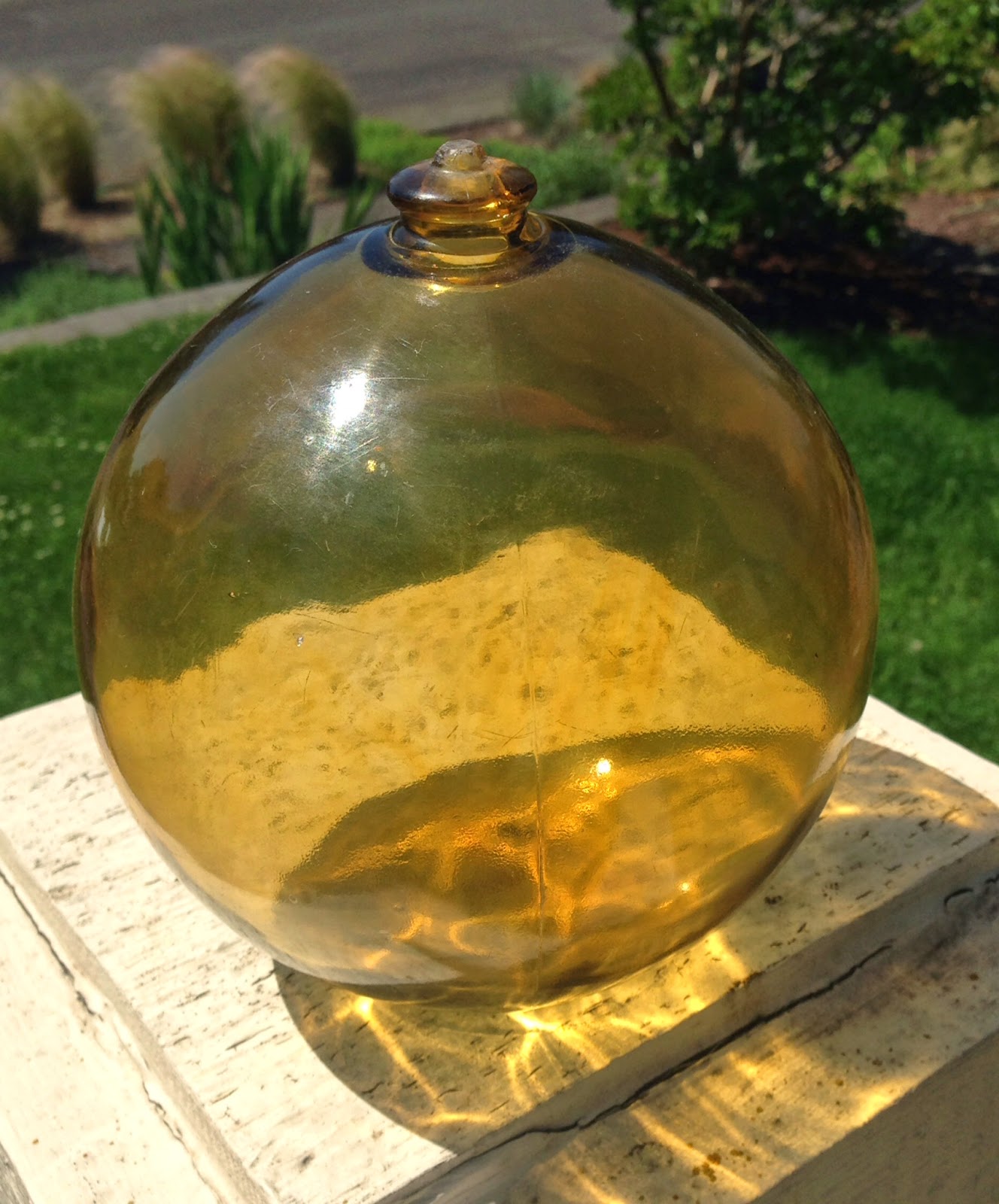 |
| 5" Amber colored NWG float from my collection. This float has darker swirls through the glass. |
 |
| The bottom of the float above. |
 |
| 5" beer bottle brown NWG float. |
 |
| The bottom of the float above. |
 |
| Sometimes the seals of the NWG floats with have this mark, but it is very rare & only a few are known to exist. Photo by Tom Rizzo. |
During World War II, the Owens Illinois Glass Company of Oakland, CA began using bottle machines to manufacture 5" glass fishing floats. At the time, supplies were cut off to Japan, Russia & Czechoslovakia because of hostilities. Cork floats could not withstand the water pressure they were being subjected to & it was difficult to obtain Spanish/Portuguese cork then. The Owens-Illinois floats are identified by the "Duraglas" near the bottom of the float, along with an "I" inside an "O" with a diamond that is stamped on the very bottom of the float. The float bottoms also resemble the bottom of a beer bottle. Below are examples from my collection.
 |
| 5" Duraglas float from Owens-Illinois Glass Co. |
In this same time period, the Crystallite Products Corporation of Glendale, CA were also making glass floats. Below is an example of this type of float.
 |
| Crystallite Float. Photo from Tom Rizzo. |
Pittsburgh Corning developed a 6" float, which consists of 2 fused halves. This was done by a machine & was 3 times more expensive than the more common American-made floats. There were only a few hundred of these produced. They were used for the soupfin shark fishery of World War II. Below is an example from my collection.
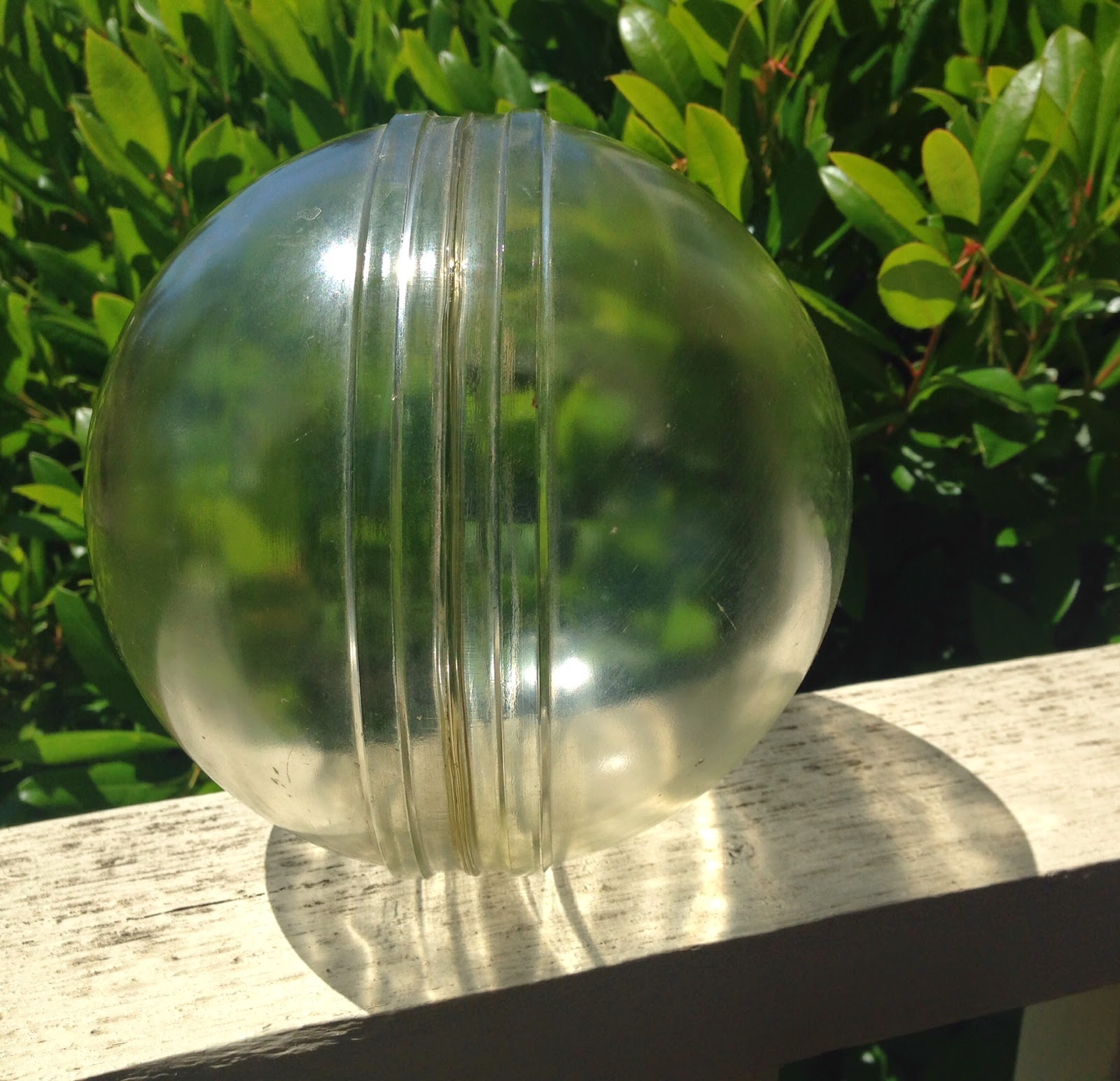 |
| Pittsburg-Corning float. |
Northwestern Glass went on to produce another glass fishing float, which is very sought after & hard to find. In 1949, they created the doughnut float. It was experimental & machine made. There were less than a dozen made. The demand for floats began deteriorating, so the doughnut float never went in to production. I know a few collectors with this particular float, but they command quite a bit of money. Below is an example from Amos Woods' book.
Another American made float bears "Cincotta Bros" embossed on the top of the float. The Cincotta Brothers floats were from Cincotta Brothers Hardware & Supplies in San Francisco. These floats were machine-made, which leads me to the thought that they were made for Cincotta Brothers by Owens/Illinois Glass Co. of Oakland, Ca., which as you know, is right across the bridge from San Francisco. These floats are not rare, but don't come around too often either. They have eluded me for years!
 |
| Cincotta Bros float from the collection of D. Markley. |
There were other American-made floats, but the information I was able to obtain about them is limited. I am including photographs of these below.
 |
| American grooved roller from my collection. |
These floats were machine made in the United States for Krabotrest, which was a crab fishing company in Vladivostok, USSR (at the time). It is estimated that 690,000 of these floats were made by the Northwestern Glass Company in 1943. They were lend-lease to the Russian company. They were all delivered to a Russian ship docked in Seattle. They are all 3 1/2" in diameter & are typically clear glass. The examples below are from my collection. The float on the left is a bit of an amber color & has the original net on it. The float on the right is the more common example.
 |
| Krabotrest American-Made Floats. |
There are a few additional American-made glass fishing floats. I will add images & information once I have it.
Reference: Beachcombing for Japanese Glass Floats by Amos Wood, 4th edition, 1985.
Thank you to Tom Rizzo for the photographs & additional information.




















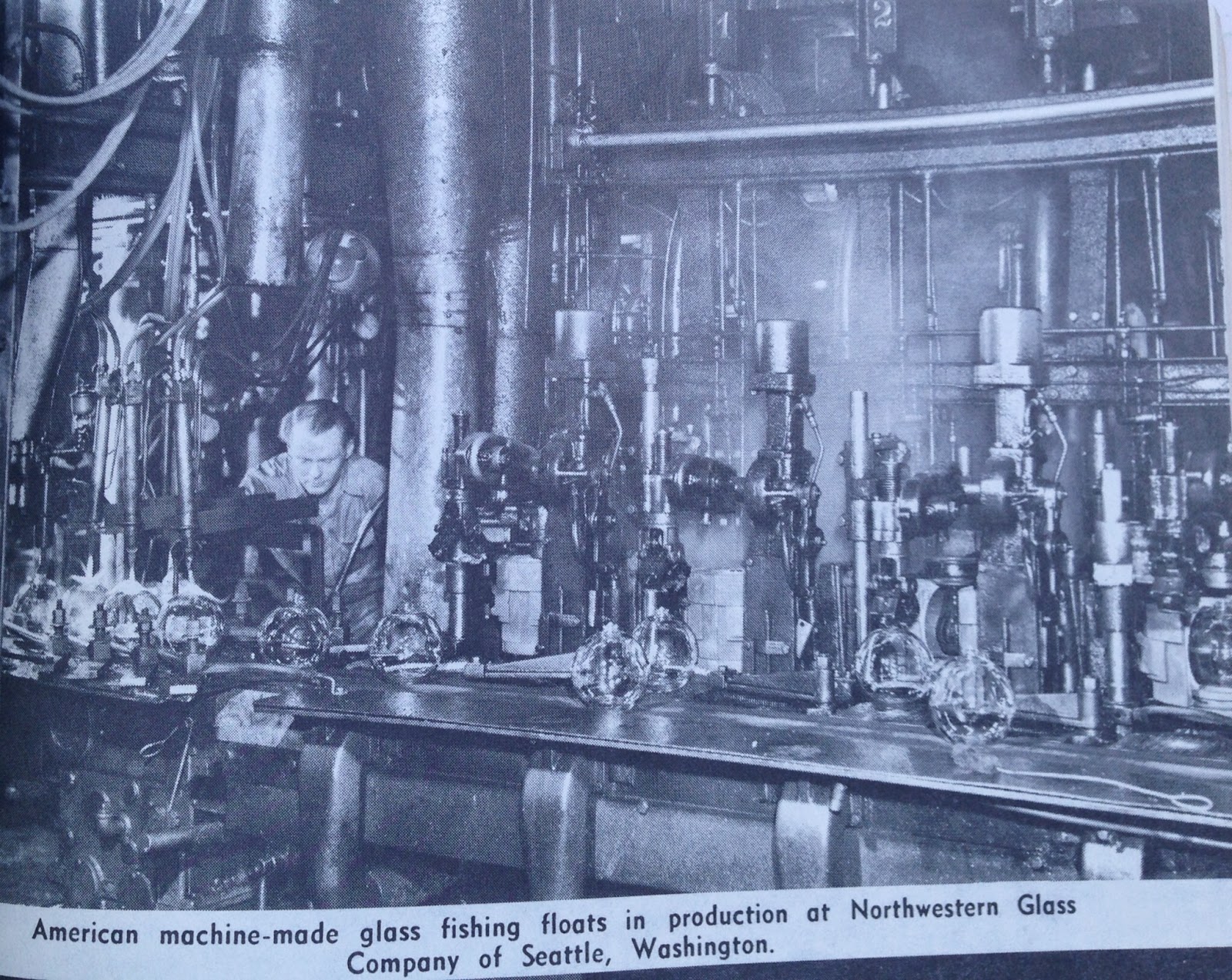




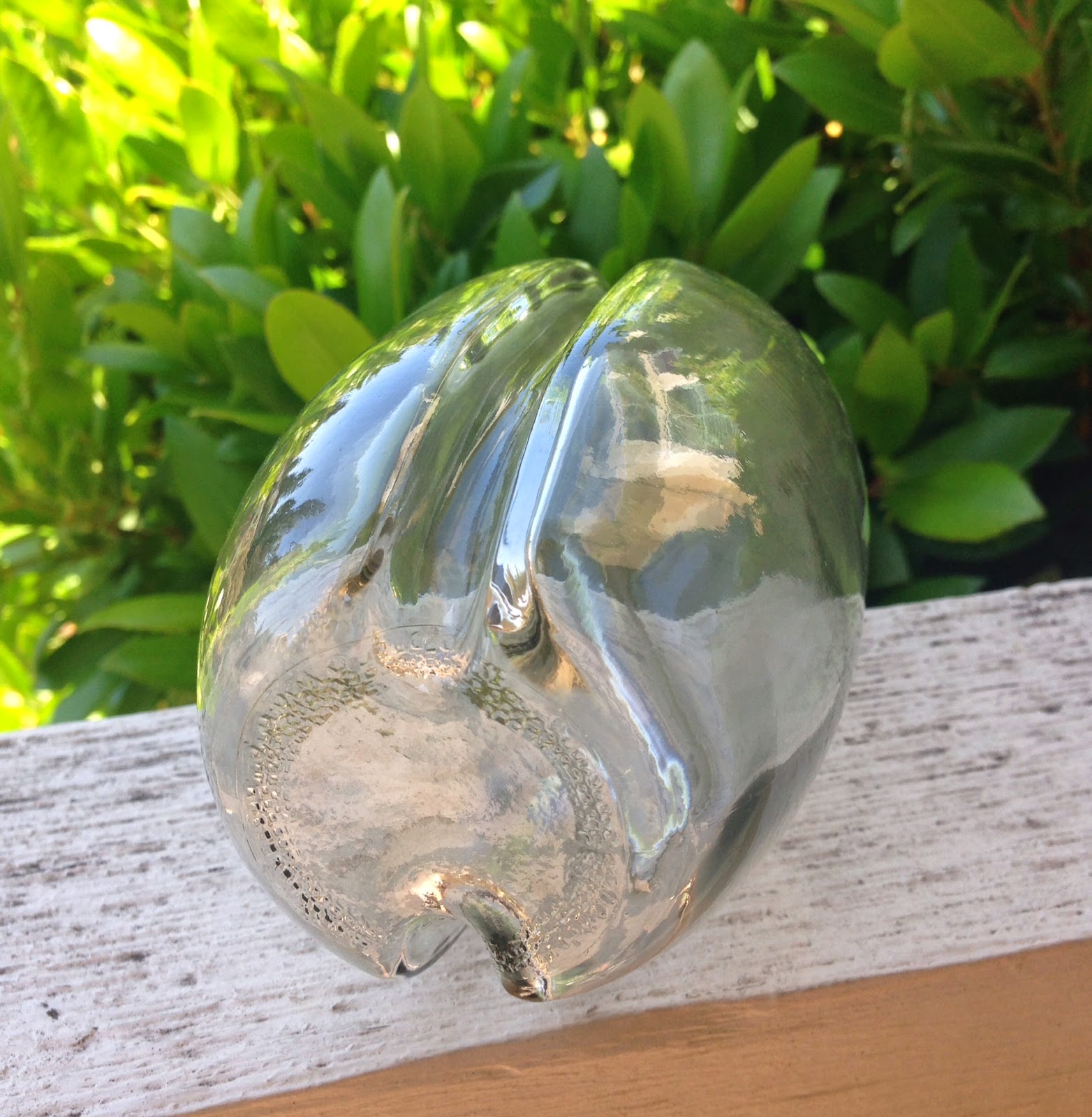


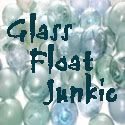
I have read & re-read this very well-written article and just want to thank you for taking the time to share your knowledge of glass floats. Happy beachcombing!
ReplyDeleteThank you! I appreciate that! :)
DeleteAppears to be incredible. Wonderful terms u have sheared with your post.
ReplyDeleteLandscape Gardening Norwich & Landscape Gardening Suffolk
This blog is very nice and have valuable information about innovative ceiling it’s very useful for me. Thanks a lot for posting this.
ReplyDeleteWine Green Glass Bottle
Beer amber and flint glass bottle
Cosmetic Glass Bottle
Sauce Glass Bottle
Medicine Pharma Glass Bottle
Honey jar and bottle
Definitely seems to be awesome. Great terms Tough out get sheared with your submit.
ReplyDeleteartificial grass in Swindon
Nice blog.thanks for sharing.
ReplyDeleteArtificial Grass Newport
Appreciate it regarding expressing this great submit i favor greatly.
ReplyDeleteBristol Artificial Lawns
Just want to say your article is striking. The clearness in your post is simply spectacular and i can take for granted you are an expert on this field. Well with your permission allow me to grab your rss feed to keep up to date with forthcoming post. Thanks a million and please keep up the effective work.
ReplyDeleteWhitefly Control services Marathon & Palm Tree Trimming Marathon
Very good website. I liked it very much.
ReplyDeleteSouth Wales Artificial Grass
Hi there.. I also have a glass float collection.. my DIL just gave me several her grandfather got in Guam. I just posted some photos on my blog if you'd like to see. What does the Japanese symbol for North mean on a float? Teresa :-)
ReplyDeleteHello,
ReplyDeleteI have 5 floats, 3 have rope. And on these floats the glass is worn in the places that the rope did not cover. I found these in Alaska. But the bottoms ate plain no numbers or markings just a circle. Could you tell me about these?
the packaging of goods on people's buying behavior has played crucial influence, many companies have put the focus of attention of the automatic sealing machine. Glass bottle Manufacturers
ReplyDeleteThis information is very useful. thank you for sharing. and I will also share information about health through the website
ReplyDeletePengobatan Herbal Rematik/Rheumatiod Arthritis
Obat Herbal Walatra Berry Jus
Cara Mengobati Telapak Kaki Berlubang
Obat Koreng Bernanah Alami
Cara Menyembuhkan Sakit Maag Kronis
Cara Menghilangkan Stretch mark
Cara Mengobati Epilepsi
Thank you for very usefull information.. glassbottlewholesale
ReplyDeletePermission to share friends, articles about health and hopefully useful for all
ReplyDeleteCara Menyembuhkan Bintitan
Obat Panu
Cara Mengobati Cacar Air
Obat Pelancar Haid Alami
Obat Susah Kencing
This article is very useful, thank you for sharing. And allow me to share articles too, it's about health and treatment. God willing it will be useful for us all. Thank you :)
ReplyDeleteObat Radang Gusi (Gingivitis)
Obat Pereda Nyeri Dada Sebelah Kiri
Obat Untuk Miss V Gatal dan Perih/Nyeri
Cara Menghilangkan Abses Payudara
ReplyDeleteIt’s a good resource for learning. I see the post again and again. Footwear photo editing services
Background Removal Service
clipping path service
Thank you for the good information and very helpful. That's very interesting. I like all the things you share and see your beautiful creations, greetings from Admin scan dokumen I hope you can visit and comment on my website :)
ReplyDeleteI have this glass sphere, I did not know what it was for until today, thank you for your good information
ReplyDeleteI also found this a well done article in both information provided and in presentation. A question:
ReplyDeleteI have recently come across 5 what look to be modified clear glass floats from, I believe to be, the Northwestern Glass Co. of Seattle. They are embossed with the Spokane Washington Expo '84. They have a slot at the top of the connector that is wide enough for coins of a quarter or smaller. Do you have any information regarding this 1984 venture?
Hi Admin, I hope are fine. I'm your one of the biggest fans, I like to read your blogs and I've also shared your blogs with my family members and friends. I hope in future you'll publish more blogs like your old ones. Please accept my thanks on my behalf of me and from my family and friends.
ReplyDelete1947 Housing Islamabad
Capital Smart City
Lahore Smart City
New Metro City Gujar Khan
Skip Hire Near Me
Camping at Pawna Lake is the ideal romantic getaway! Gorgeous scenery, comfortable tents, and treasured memories. Great for couples!
ReplyDeletepawna lake camping for couples
camping near pawna lake
I just wanted to make you aware of antique target balls they look a lot like the floats, but they were used as target practice 1820-1900's they are often confused with floats and are a rare find. They are normally open on one end due to the neck being cut off as they are launched into the air. Just thought I would let you know just in-case.
ReplyDelete